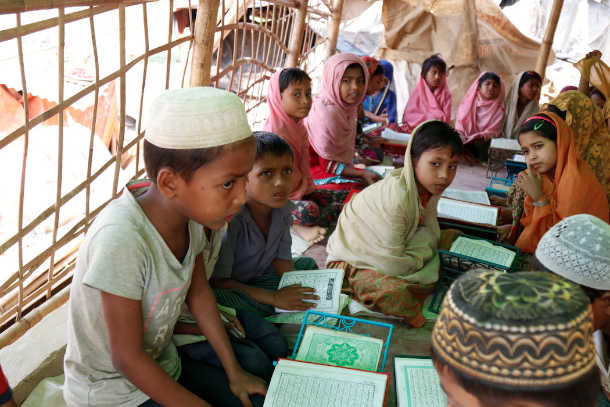
Rohingya children study the Quran at a madrasa in Balukhali refugee camp in Cox’s Bazar district of Bangladesh in early 2018. (Photo by Stephan Uttom/ucanews.com)
Adbul Noor was a ninth-grade student at Leda High School near Teknaf town in southeastern Bangladesh, but in March he and some other Rohingya refugee children were suddenly expelled.
The only reason given was that as Muslim refugees from neighboring Myanmar, they were not Bangladesh citizens.
Being shut out of school was heartbreaking for 16-year-old Noor, the youngest of five brothers. "I wanted to have an education so that I could have a better life than my brothers who didn't go to school at all," he told ucanews.com.
For weeks, Noor sat idly or filled in time playing at the sprawling Leda refugee camp in Cox's Bazar district. Noor's parents fled to Bangladesh from Myanmar in 1992 and this camp is where Noor was born and raised.
Noor recently started attending a traditional madrasa Islamic school where he studies Islamic texts, notably the Quran. While Noor is disappointed that he cannot also learn secular subjects such as English and mathematics, he has no other options.
Hundreds of Rohingya refugee children like Noor were expelled from schools following a government order on grounds that they had no entitlement to be there. The move effectively reduces the mingling of Rohingya and Bangladeshis, who are also overwhelmingly Muslims.
The ban drew domestic and international criticism, but it continues to be enforced.
Cox's Bazar is housing more than one million Rohingya refugees from Myanmar's Rakhine State who fled deadly persecution by security forces and their local supporters.
According to the Office of the United Nations High Commissioner for Refugees (UNHCR), more than 723,000 Rohingya have crossed the border into Bangladesh since August 2017.
International and local aid agencies operating in 30 refugee camps in Cox's Bazar have set up hundreds of basic education facilities. They cater for about 180,000 Rohingya children but only for the primary level of education, which comprises grades 1-5.
It is estimated that there are nearly half a million refugee children in need of a basic education.
There is a huge gap. And refugees themselves, with support from Bangladeshi Islamist groups, have established a network of madrasas in the camps where children can get a Quran-based religious education.
By ordering expulsions from schools without providing an educational alternative, the government has left Rohingya children open to manipulation and radicalization, according to Abu Morshed Chowdhury, a rights campaigner and social activist in Cox's Bazar.
"Most Rohingya people didn't get any education back home, so they are already a vulnerable community," Chowdhury told ucanews.com.
“If we fail to offer them education, their condition will get worse whether they stay here or get back to Myanmar. Otherwise, they remain vulnerable to be exploited and even get radicalized by opportunist, extremist groups.”
Fears of indoctrination
In a recent report, the Brussels-based International Crisis Group warned about the presence of extremist groups in refugee camps, although it didn't accuse madrasas of spreading radicalism or intolerance.
“No evidence has emerged of these madrasas promoting violence or intolerance among children, or of indoctrination or recruitment by local or transnational jihadists. However, a policy of denying young people formal education and leaving them reliant on unregulated madrasas almost certainly increases the risks of such groups gaining a foothold in the camps,” the report stated.
Madrasas are not a viable alternative for formal schooling because they lack general education subjects, said James Gomes, regional director of the Catholic charity Caritas, which operates among Rohingya refugees.
“Furthermore, there are risks that Rohingya children might get indoctrinated if the madrasa system is not monitored, which is so far under control," he told ucanews.com.
Gomes said the government needed to collaborate with aid agencies to come up with the best approach to address the education requirements of Rohingya children.
"The government needs to do some research to decide how best Rohingya children can get a basic education in the camps, and what to do about them when they finish primary education," he added.
A government education officer, Anandamoy Bhowmick, agreed that there should be planning in regard to secondary education for Rohingya children.
Rohingya language, culture and religious practices have much in common with those of Bangladeshi Muslims, but here they are often considered to be "unwelcome guests."
Historians have traced the presence of Rohingya in what was the independent Arakan kingdom, now part of Rakhine in Myanmar, to as early as the eighth century.
Yet Rohingya have in more recent times been branded as illegal immigrants from Bangladesh by successive military governments and much of the Buddhist population.
Since the 1970s, in the face of systematic persecution and denial of rights such as citizenship, they have fled Myanmar to other countries, most notably Bangladesh.
Two deadly military crackdowns in Rakhine in 2016 and 2017, following Rohingya militant attacks on Myanmar security forces, triggered one of the largest refugee exoduses in modern times.
Under international pressure, Myanmar signed a repatriation deal with Bangladesh in November 2017 to take back Rohingya from the overcrowded refugee camps. But the plan has been in limbo since then. Not a single Rohingya has been repatriated.


